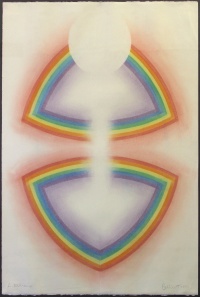Antahkarana (art work): Difference between revisions
No edit summary |
No edit summary |
||
| (2 intermediate revisions by 2 users not shown) | |||
| Line 1: | Line 1: | ||
{{DISPLAYTITLE:''Antahkarana'' (art work)}} | |||
''Antahkarana'' is a pastel created by [[Burton Callicott]], a member of the Memphis Lodge of the [[Theosophical Society in America]]. It hangs outside the Meditation Room in the [[L. W. Rogers Building]], the headquarters of the TSA in Wheaton, Illinois. The display caption states, "Shows two triangles, the higher and the lower aspects of our nature. A shaft of light rays down, connecting the two. This ray is the antahkarana, the bridge between the divine Self and the personal soul." | [[File:Callicott Antahkarana 1.jpg|right|200px]] | ||
'''''Antahkarana''''' is a pastel created by [[Burton Callicott]], a member of the Memphis Lodge of the [[Theosophical Society in America]]. It hangs outside the Meditation Room in the [[L. W. Rogers Building]], the headquarters of the TSA in Wheaton, Illinois. The display caption states, "Shows two triangles, the higher and the lower aspects of our nature. A shaft of light rays down, connecting the two. This ray is the antahkarana, the bridge between the divine Self and the personal soul." | |||
The artist donated the work in the year 2000, when he was 93 years old, along with another work, [[Mandorla (art work)|''Mandorla'']]. The dimensions of the pastel are 26 x 18.5 inches, or 66 x 47 cm. | The artist donated the work in the year 2000, when he was 93 years old, along with another work, [[Mandorla (art work)|''Mandorla'']]. The dimensions of the pastel are 26 x 18.5 inches, or 66 x 47 cm. | ||
[[Antaḥkaraṇa|Antaḥkaraṇa]] is a Sanskrit term sometimes translated as "rainbow bridge." | [[Antaḥkaraṇa|Antaḥkaraṇa]] is a Sanskrit term sometimes translated as "rainbow bridge." Callicott painted at least five versions of antahkarana, and wrote: | ||
<blockquote> | |||
"Antahkarana" is a Sanscrit word that means "bridge." It is used in the [[The Secret Doctrine (book)|Secret Doctrine]] as the term for the pathway between the material self and the spiritual self. | |||
As a subject for paintings, the symbol appeared naturally out of the [[mandorla]] image: by segmenting the mandorla to make two separate curved tringles and connecting them to one another by a narrow vertical band of white, the "antahkarana." The delineating element as in the mandorla series is the rainbow spectrum.<ref>Burton Callicott, "Antahkarana" Art & Soul (2020), 106.</ref> | |||
</blockquote> | |||
== Notes == | |||
<references/> | |||
[[Category:Art | [[Category:Art works]] | ||
Latest revision as of 19:53, 23 September 2021
Antahkarana is a pastel created by Burton Callicott, a member of the Memphis Lodge of the Theosophical Society in America. It hangs outside the Meditation Room in the L. W. Rogers Building, the headquarters of the TSA in Wheaton, Illinois. The display caption states, "Shows two triangles, the higher and the lower aspects of our nature. A shaft of light rays down, connecting the two. This ray is the antahkarana, the bridge between the divine Self and the personal soul."
The artist donated the work in the year 2000, when he was 93 years old, along with another work, Mandorla. The dimensions of the pastel are 26 x 18.5 inches, or 66 x 47 cm.
Antaḥkaraṇa is a Sanskrit term sometimes translated as "rainbow bridge." Callicott painted at least five versions of antahkarana, and wrote:
"Antahkarana" is a Sanscrit word that means "bridge." It is used in the Secret Doctrine as the term for the pathway between the material self and the spiritual self.
As a subject for paintings, the symbol appeared naturally out of the mandorla image: by segmenting the mandorla to make two separate curved tringles and connecting them to one another by a narrow vertical band of white, the "antahkarana." The delineating element as in the mandorla series is the rainbow spectrum.[1]
Notes
- ↑ Burton Callicott, "Antahkarana" Art & Soul (2020), 106.
